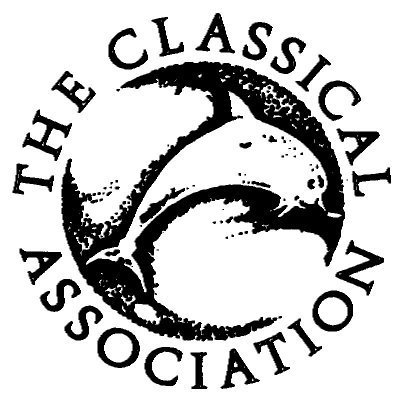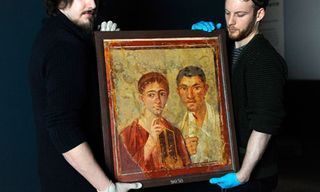Mary Beard's Blog, page 46
April 6, 2013
Thank you to the Class Ass.
I have just been very very lucky. I have won the Classical Association Prize for 'a significant contribution to the public understanding of Classics'...about which I am dead chuffed. Previous winners include Peter Parsons, Charlotte Higgins, Tom Holland and Caroline Lawrence .. and it is very generous. (OK, let me confess, as you'll only ask, it was £5000... some of which, for what it's worth, I shall be giving to my Faculty without which and whom none of what I do would be possible.)
The presentation of the cheque was at the annual Classical Association conference dinner, a delightfully boozy occasion brilliantly hosted in Reading this year, marred for me only by the thought that over the course of the evening I would lose the cheque. (The good news is that I didn't and that it is now on the kitchen scales waiting to be paid in.)
I did get the chance to say a "few words" in my "acceptance speech".. and what I wanted to hammer home was that "classical outreach" was a communal operation. Classics has a great public engagement record stretching back more than a hundred years -- and it's grounded in the fact that it has something to reach out with. (To put it in basic terms, if you don't have a strong research base and new things to say, you might as well forget "outreach"... because it will be built on sand.)
The example I plucked out of the air was the popularity (and commercial success) of Greek drama on the West End stage. This is partly down to those who inspire directors, or write reviews, or appear on tv explaining why this or that play is so importantly interesting.
But it is also down the man or woman who has spent many moons unglamorously in the library trying to work out what the "ge" means in line 429 ("ge" is often translated from the Greek as "at least", but it means a lot more, and a lot less, than that).
In fact public engagement is often done best by those who have spent the lonely hours in the library puzzling over the "ge"... or, to put that more strongly, if you haven't done your "ge" duty, you arent likely to do the best job in inspiring others to be really interested.
On all this I feel pretty strongly: talking to people more widely outside the academy demands no less specialist infrastructure than writing for those within it. "Popular" writing is a different way of writng with just the same knowledge base.
So far so good. But there were a couple of stings in the tail.
First, I tweeted rather joyously yesterday that I had won the "Class Ass" prize. And the reaction of many on twitter was that I has won the proze for the best bottom in town -- which just goes to show how un-tuned one can be to puns on one's own doorstep.
Second, the fear of losing the cheque delivered in another way. When I tried to get into my office in the faculty building on Cambridge this morning, I found I didnt have my Uni card, which lets me in (as well as letting me into the University Library and countless other places I need to go). I had it in my pocket while I was going in and out of the Faculty Library on Thursday, and I guess it is somewhere there -- as, the fact is, you need it to get IN to the library but not OUT...but meanwhile, until it comes to light, I am an outcast.
If anyone has found it, please let me know.
April 2, 2013
What I did at the holiday: up the tower and down the mill!
I've got used to thinking of bank holidays as a chance to catch up on work.Boring eh? But having someone to stay (over the last three days it's been Samuel -- our South Sudanese friend) does make you get out and actually DO something. And the anxiety about the work left undone soon becomes outweighed by rewards of a bit of local tourism.
On this occasion we did a cathedral and a watermill: Ely Cathedral and Houghton Mill.
We'd been to Ely before of course (it would be difficult to live in Cambridge for nigh on 30 years and not have got to Ely), but ended up finding plenty new.The first thing was a tomb memorial that we'd simply never spotted -- to the architect George Basevi, who died in the cathedral in 1845, falling off/through the West Tower (always a cautionary tale for young architects). He has a rather smart faux-medieval brass, but what struck me most was that he is holding in his hands (you can just about see it in this picture) a plan of the Fitzwilliam Museum that he had designed but never finished.
have got to Ely), but ended up finding plenty new.The first thing was a tomb memorial that we'd simply never spotted -- to the architect George Basevi, who died in the cathedral in 1845, falling off/through the West Tower (always a cautionary tale for young architects). He has a rather smart faux-medieval brass, but what struck me most was that he is holding in his hands (you can just about see it in this picture) a plan of the Fitzwilliam Museum that he had designed but never finished.
So he was immortalised with what was to become (after it had been completed by C R Cockerell) his masterpiece.
The next thing was to go up the tower -- not the West Tower from which poor old Basevi fell, but the Octagon Tower over the crossing.
I'm not usually a great fan of church towers. Usually it seems that you pay through the nose to climb a lot of steps and -- if there is a guide -- he tends to drone on with inconsequential stories of mad vicars. And after all towers are pretty similar, seen one, seen them all.
But, because we had Samuel with us (who hasnt done church towers in South Sudan), we thought we'd better do it. It certainly was pricey (Ely cathedral isnt a cheap touristic option), but it was worth every penny.
For a start, it was a fantastic view. You actually go up into the lantern over the crossing... and they open the great shutters (with painted angels on) and you can look down into the cathedral below; and that's before you go outside on the roof.
And we also had the most brilliant guide. No tales of barking bishops, but a really good hour's worth of top rate information on the structure and history of the extraordinary octagon, back to the fourteenth century). We came away actually feeling that we had learned something.
That was Saturday. On Easter Monday we tootled off to a place we hadnt been before: Houghton Mill. It didn't quite have the WOW factor of the Ely tower, but it was pretty damn good. A water mill, built in its current form in the mid eighteenth century, and still in working order. Indeed on Easter Monday it WAS working, and we came away with a Houghton Mill bag of real stoneground flour.
It's now owned by the National Trust, and largely staffed by volunteers (who didn't get in your face); and they nicely grind the grain from their farm at Wimpole. A really gorgeous hour or so out.
Five stars all round.
March 30, 2013
Reviewing the reviews
People occasionally ask me if they should reply to some published review of their book which they think is wrong, unfair, unprofessional . . . or downright outrageous. I'm usually a bit ambivalent. The best advice to a friend always has to be "No, don't write an outraged letter of complaint to the editor, setting the record straight". The reason is simple, it will only draw attention to the offending review, which most people in the world will not have noticed anyway (who ever scrutinises a review as carefully as the author of the book concerned?). "If you must write, then make it witty, not hurt. But it's better to claim the highground in other ways, like inviting the reviewer to lunch to talk about it, all nice as pie..."
Yet wearing my more journalistic hat, I must confess that I do rather like to see a good dispute between the reviewed and the reviewer in the letters pages, with the battalions of supporters drawn up on either side. And there is a sense that if someone has said something simply wrong in a review, then they should be called to account.
The more general question that this raises, though, is what makes a "good" review from the point of view of the person being reviewed anyway -- as I've had a cause to reflect over the last few weeks with the reviews of my Confronting the Classics. All the more so, as it is a book that is actually grounded in a series of reviews.
(Fear not, this isn't going to turn into a gripe; overall I'm pretty damn happy.)
OK, it would be decidedly dishonest to say that the reviewee is not touched by lavish praise. I really have glowed a little when people have said in these recent reviews how much I've done to keep Classics alive, even though I think that my part has been no greater than many of my friends and colleagues. The support of Classics is very much a communal operation, and I do get perhaps more credit than I deserve ... which is I suppose, for worse or better, the power of telly.
But the bigger truth is that most people want their book to have been read with attention and care, whether the reviewer agrees with it or not. Years ago I became great friends with someone whose book I had reviewed pretty critically; I still remember her explaining that she was delighted to have had someone really engage with the arguments -- which meant much more to her than agreement or praise.
So I was actually very pleased when Edith Hall in the Times said lots of nice things, but also took me to task for writing this (re E. Fraenkel):
"On the one hand, it is impossible to not to feel outrage at a straightforward case of persistent sexual harrassment and the abuse of (male) power. On the other, if we're honest, it is also hard to repress a bit of wistful nostalgia for that academic era . . before the erotic dimension of pedagogy . . . was firmly stamped on".
These words have been much debated, both criticised and praised, profitably and unprofitably. I really dont want to re-open all the issues here, except to say that Hall was absolutely right, in attacking the use of the hegemonic first person plural ("if we're honest"). It really ought to say "if I'm honest" -- as I'm very happy to concede, and aim to change if there is ever a new edition. You can read a version of the Hall review on her blog.
The other interesting issue is the role of reprinted reviews and essays (or perhaps better "review-essays") between hard covers. I have a vested interest in this, in more ways than one. But I really do believe that some of the most interesting contributions to classical and other debates still come in the form of substantial discussions (sometimes 3500+ words) in the mainline literary journals (TLS, LRB, NYRB); that these should not be thought of as "ephemeral"; and that they do (when collected together) become more than the sum of their parts. Indeed I think that Confronting does give a good glimpse of where Classics is at now, as well as making a neat introduction to the ancient world for the interested "outsider".
I can also see that one could reasonably take another view, and it's all very worthwhile discussing. The only time I got a bit cross was when one reviewer said that most of these pieces were available free online in a very similar form. Hang on, I thought... apart from a few "loss leaders", they're only freely available if you're already a subscriber to the TLS, LRB, and NYRB. And that can't include more than a handful of literary obsessives . . .
But whoops, am I contravening my own friendly advice here?
March 27, 2013
Opening Pompeii
I went last night to the opening of the Pompeii show at the BM. Boris J did the main speech, addressing us as docti and doctissimae (maybe something of a comedown after his opening of the Hadrian show, when he did the whole thing in both Latin and English). He was extremely funny, though in truth 12 hours later I have entirely forgotten the jokes (which may I suspect be indicative about BoJo's staying power).
The exhibition is really excellent and worth the visit -- partly because of the greatest hits it includes (like the picture above) but partly it has such a lot of the stuff that is not on display in Italy. That's to say, if you have been lucky enough to visit Pompeii a few times, there is still plenty here that you wont have seen.
For me the highlight is the furniture -- because it's what always seems missing from any visit to the site itself. In fact, plenty did get carbonised at Herculaneum and it's all kept together out of the public eye in a storage room on the site. Anyway some choice pieces have come here (not just the baby's cradle that I was allowed to rock when we filmed Meet the Romans, but a table, and a wind-lass... etc ).
In terms of wider issues of museology, I think one issue that we'll be discussing with the students in Cambridge is how Pompeii and Herculaneum come across differently when they are boiled down to objects.. rather than experienced as urban sites.
On site the pleasure of the two little towns is rooted in that experience of wandering the real Roman streets, and twisting your ankle in the real Roman cart ruts. So what happens when you are looking a star items in a beautifully displayed exhibtion. Partly you see the quality of some stuff not noticed before. Pan and the goat, for all its notoriety, is actually a wonderful work of art. (Same is true for a couple of statues of Livia you meet on the way in.)
Other things lose by their museum context. I doubt, for example, that without a bit of help many people will get excited by the painted electoral slogan.
But there will be help. I've been involved in planning a whole range of events which take the "Pompeii experience" a bit further. We'll be doing a kind of "Virgil masterclass" (reading some Latin even if you dont know more than amo amas amat).. and we'll be hosting a big discussion about what the point of learning Latin. I hope it won't just be full of the converted.. do come to have a good argument.
March 24, 2013
Can you undo "damnatio memoriae"?
For as long as I can remember, I've taken students and friends in Rome, to see a great example of modern "damnatio memoriae". That's to say when an unpopular Roman emperor finally died or was disposed of, it was not uncommon for people to take a chisel to the inscriptions that bore his name and hack it out.

It was an ambivalent exercise -- because, of course, as you see on this stone from which the name of Geta has been removed, it both removed the name and drew attention to its removal.
Anyway, I have often had fun using the modern inscription at the top as a great example of the practice of "damnatio" still going on in the mid twentieth century. It's the inscription from the square in Rome that Mussolini erected around his reconstructed Mausoleum of Augustus. And it orginally read, in Latin "This place, where the spirit of Augustus flits through the air, after the emperor's Mausoleum had been excavated from the darkness of the ages and the scattered fragments of the Altar of Peace had been restored, Mussolini il Duce had the old narrow lanes demolished, and ordained that it should be embellished with more splendid streets, building and monuments suitable to the character of humanity. 1940, 18th year of the Fascist Republic."
But as you can just see at the top, after the fall of il Duce, someone came along and defaced the thing, removing the letters "..lini dux", to leave only "Musso" which is Italian slang for donkey. A nice "damnatio" joke.

Anyway on Friday I was there with a couple of friends to whom I planned to show this and tell the little story.
But when I got there, all had changed. Someone had put back the letters that had been removed (had they actually been chiselled off or just cemented over, I now wonder).
But who? And when exactly did it happen? Was it the result of some campaigning from Mussolini's twenty-first century supporters?
A quick google did produce a couple of sites pointing out what had happened. But I didnt find out WHY.
March 20, 2013
New pope? New Roman emperor?
A comment from Roy Lewis on the last post reminded us that the claims that Pope John Paul I had been "eliminated" were not unlike all the rumours about the suspicious deaths of Roman emperors. They may have died (like John Paul I) in the their beds, but that didnt stop the rumours of murder by smothering or poisoned mushrooms or whatever taking hold.
It made me think that the first weeks of a new Pope were much more like the first weeks of a new Roman emperor than the first weeks of a new Prime Minister or President are. It is not a question of going off and making your mark in parliament, winning votes or whatever. It's a question of establishing a relationship with the people/worshippers -- and of balancing that with making the right impression with the elite of the Catholic hieracrchy.
I am right now in Italy. And many people I have met have been dead keen on Papa Francesco. They have loved the idea that he appeared on the balcony of St Peter's and said "have a good lunch". It has also gone down well that he talked to his fellow cardinals as "brother cardinals", and that he rejected the papal limo and went almost incognito to visit a friend in hospital.
My first instinct was to think: what a nice guy. My second instinct was to think: what an excellent PR machine.
My third instinct was to think that the PR machine was well acquainted with the dynamics of Roman imperial rule, and how Roman emperotrs got a good start.
The first Roman rule for a new emperor was to speak directly to the people (and going off script and talking about Sunday lunch would really fit the bill there).
Second was the idea that you didnt lord it over the rest of the elite. The best emperor showed himself as primus inter pares... so "brother cardinals" was spot on.
And the final thing of course was to distance yourself from the faults of your predecessor. So Francis makes it clear that he is not the kind of academic, austere, remote theologian that Benedict was -- just like Nero said he wouldn't be doing things behind closed doors like Claudius had; or like Caligula burning all the records of the secret police when he came to power.
The only trouble was that most of these emperors started well, but things went quickly to the bad. Caligula, for example, did make his bonfire, but he had carefully kept a copy of those records for future reference.
So we wonder how Francis I will turn out.
March 16, 2013
The "King of Nemi": how long does it take the penny to drop?

I am about to go off to Italy (on a recce for a possible tv programme, and for more honourable reasons). And I have been thinking about the about the story of the Rex Nemorensis, which memorably starts Frazer's Golden Bough. This was the priest of Diana at Nemi (just outside Rome, nicely imaged above) whose succession was distinctively violent. You could only become the priest of Diana at that particular site if you killed the previous incumbent.
The story was that Caligula (the "mad" emperor Gaius) insisted on a change of regime at Nemi, and hired an adversry to unseat the reigning king. And this was what Frazer had fixed onto in thinking about the primitive divine kingship with which he was so preoccupied.
But isnt there another way of seeing this?
One of the things that Walter Scheidel, among others, has recently stressed is the pattern of violent succession in the transmission of imperial power: most of them either were, or were alleged to have been, murdered. There was never so violent an image of succession as you find in Rome.
So how do we understand Caligula's reported intervention in the succession of the Rex Nemorensis? Frazer had one rather mystical view. But it has just struck me far too late (how long DOES it take for the penny to drop?) that the Rex Nemorensis was at root a metaphor for Roman imperial power itself (the rex of the Romam empire that would never call himself such, but kill your predecessar was the basic rule).
What Caligula was saying was that the transmission of power between reges was alway necessarily bloody.. and the joke about the Rex Nemorensis as always already about imperial power in general: kill the bugger.
I guess that someone else has seen this before, but I had been dumb and hadn't.
March 13, 2013
More on the use of lectures
The IPPR think-tank has just published a report on the future of universities. It's wide ranging and far from stupid. But the focus of most reporting was on the idea of lectures, and how time expired they basically were.
Why, if you can see Niall Ferguson on your laptop, would you bother to turn up to hear Dr MuchLessFamous in the lecture theatre itself?
I'm all for raising this question, but I was suprised that noone in the reports of the report that I heard or read, or in the document itself, made any defence of the traditional lecture.
Nor did they ask what we thought lectures were for.
The first point has to be that (despite the assumptions of the IPPR report) lectures are not primarily for the transmission of information (or not alone). If that's what you want, then for heaven's sake go to a book. I mean if you want Niall Ferguson's views on empire, you'll get them a lot more efficiently from the written version.
As I have come to see it, lectures partly transmit information; but they are more importantly about changing minds and attitudes. And that's only done when you know who it is that you are talking to. I mean if you come to hear me lecturing about the Conspiracy of Catiline, I hope you'll go away with more information -- but also with a way of seeing that only comes from the kind of eyeball to eyeball confrontation that a lecture represents.
That's partly about the ability to answer back, face to face....and I dont mean the virtual answering back, the sending in an email with a query. I mean the hand-up that says 'sorry Prof Beard, but I'm not sure you're right"... the hand-up that is shared with the rest of the audience.
And it's partly about just seeing who you are talking to, and talking directly to them. Sure, I could give a lecture that could be sent round the web, about (lets say) the Fall of the Roman Republic. But those views would be much more speedily got across from what I have written. When I lecture I am engaging in human interaction with an audence who is actually there. That's what a lecture's about! And I am talking to the audience.
I am sure that some lectures impart infornation efficiently on the web, but they are, for the most part, the uninteresting ones. Not entirely - there is a great tradition of wonderful radio talks. But the best lectures for students are delivered TO THEM.. in groups of a 100 to 200. They are not celebrity performances to a million.
It's about interaction not display.
March 9, 2013
Please can I open the window?
I'd better start by saying that in broad terms I am very strongly behind "robust" planning laws, and I think that the Tory suggestions of watering these down are ikely to lead to towns and cities that we don't want to live in or much look at. Likewise, inconvenient as it may be to have the Building Inspector round, I have no doubt the Building Regs are a good thing . . . if they only catch the occasional rogue contractor skimping on the foundations, that has to be worthwhile. (And I should point out that they are no new idea; they go back at least to the emperor Nero after the fire of Rome.)
My complaint is only a little one: I dont see why it couldn't be up to me to decide, if I live near a road, whether I want to have double glazing or windows that will open for a bit of "fresh" air.
Let me explain my situation. We live on one of the main roads leading out of Cambridge. But our house, like the others nearby is set quite a way back from the highway, behind a substantial hedge and trees; and opposite us there are no houses lining the street, but a large college playing field which seems to encourage the noise to escape. We have secondary glazing in one room on the ground floor, which was here when we arrived, and we don't notice the traffic -- which isn't very great in the evening or at night anyway. And there is no suggestion that air pollution levels are high.
Anyway, one of our neighbours just put in a planning application for a very nice extension, which got permission without trouble and will make a definite improvement to the house. It was what the planning officials (environmental health branch) said about the noise, and the logic lying behind their remarks (all published on their website), that made me see red.
The plans, they correctly pointed out, envisaged habitable rooms on the side of the house facing the road. And how noisy was that going to be? Well, they didn't actually have any decibel readings from our street, but they did have them from some other streets in town and those readings suggested that the noise levels here might be too high to accord with the relevant British Standard for noise pollution. They conceded that there were differences: the other roads have houses 3 metres from the traffic, whereas this house is 18 metres from the traffic "which will reduce the noise exposure on future
occupants". So they proceeded to do a calculation based on the same traffic level, factored down by the extra 15 metres distance from the road -- and hey presto the noise levels were still above the British Standard limits.
The next concession was to stress again that the noise level might not anyway be the same on our road as on those from which they had the measurements. But just to cover themselves they suggested, on no more than a guess so far as I could see (and one not backed up by my own experience), that the noise levels here might actually be greater....
And the recommendation? That it should be a condition of the development that there should be "acoustic glazing" in the habitable rooms on the road side. But, hang on, there's also got to be ventilation for when it's too hot. Yes, they conceded again, these rooms will need a mechanical ventilation system with a booster fan, which will of course add to the decibels... so that will all have to be taken to into account, when trying to get down to the required noise levels.
OK. I can see what the point of these rulings are. We want to stop people building new spec housing next to the mainline railway line and trying to flog it off to some unfortunate people who will end up deafened.
But in this case I really couldnt see why the occupants couldn't just be given the choice of having opening windows if they wanted them....noise or not. Some people live under the Heathrow flight path for heavens sake, and I bet their decibel levels are a lot higher.
March 6, 2013
The art of smart criticism
Over the last few weeks I've had plenty of opportunity to reflect on how principled disagreement can get morphed into crude abuse. That is to say, when I say something about migration with which some people I disagree, quite a few people on social media decide to say that I am "stupid" or "evil" or a "disgrace to the academy" or whatever. Hang on, I think. We disagree... that doesn't mean that I am nasty/ignorant (nor you), it means we disagree.
And I'm not the only recipient of this stuff. Maybe I have missed the irony here (dont think so), but there was a blog by John Rentoul recently which criticised the London Review of Books' stance on Israel. Fair enough, it's hard to see a single good line on this one. But the idea that the paper's stance made the LRB editor Mary-Kay Wilmers "evil" (as Rentoul put it it) seems bonkers to me. Since when has expressing or supporting a different view meant you are "evil"? Wrong maybe, or controversial or whatever. but "evil"?(And since when has "Mary-Kay Wilmers" been an anagram of "Cruella de Vill"?)
One of the main arts of criticism surely rests in part on a sense of humour... and on sticking the knife in in a way that the victim would see the point, and possibly grin. Unless you make an impact on the person criticised, what's the point?
This happened to me recently.
There was a very nice review of Radio 4's In Our Time in the Guardian a few days ago, by David Hepworth -- it was hugely admirative. Though it also admitted that there were occasions on which IOT didn't quite come off. One of these occasions, he said,was the introduction to the recent Romulus and Remus programme -- started off by me. Now I had been quite pleased by how I had explained the complexities of this wonderfully complicated myth. And I had a number of pats on the back on the very same subject. Well done for the entrancing account, they said. But I guess I did see what Hepworth meant when he wrote, on listening to this exegesis: "I was reminded of the first time somebody tried to explain to me how an endowment mortgage worked."
Fair cop I thought. But maybe the complexity is exactly the point of this kind of story. (I mean, if you're not baffled, you haven't got the point.)
Though I have to say that I had the last laugh on this one. In the Guardian, Hepworth attributed this opaque bit of mythography to Mary WARNOCK. I have to say I'm flattered..(who wouldnt be flattereed to be taken for M Warnock) but, accuracy....? Isn't that what IOT stands for!
You can listen here.
Mary Beard's Blog
- Mary Beard's profile
- 4114 followers














